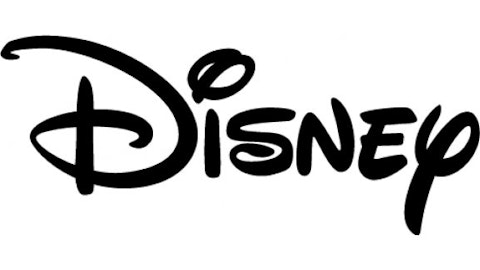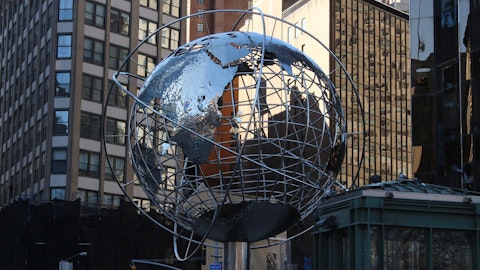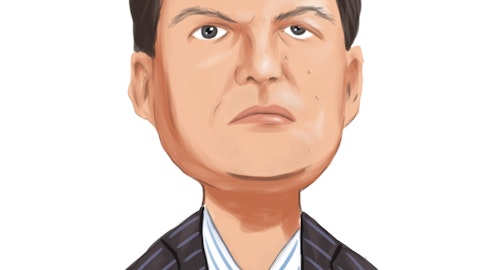Having said that, there’s a lot of content that’s not being consumed heavily on Max, and so those are the easy ones. Everything that we license is always not exclusive. We keep a full, the full rights to all that content and we have it on Max and in some cases we also have it on AVOD. So we really get the Monday Morning Quarterback and take a look. In terms of some of the content that you’ve seen like DC we put those in Windows, so someone might have it for three months or six months. We always have those movies and we have the complete set of all those movies. And candidly we have found, one we won’t do it unless the economics are significant, but in many cases it really helps us. People come back and then they want to see the full bouquet of DC movies and the only place to do that is with us or it enhances the quality of the DC library.
So overall I think we’re trying to figure out exactly how to maximize the value and we debated all the time, I think we’re doing a very good job, but as I mentioned there’ll be a lot that you’ll never see because it just belongs to us. On the News and Sports, look, we’re only six weeks in, but it is quite encouraging that we’ve looked at what happens to the people that spend time watching news and sports and churn is down and engagement is up. In some cases engagement is up meaningfully. The people that are watching in many cases, in the overwhelming majority of cases are people that don’t have pay TV. So we’re reaching a whole new audience and the audiences are younger. With CNN Max, we launched effectively a whole new service and we really geared it toward a younger group of people that are more S5 [ph] digital viewers and that’s what Mark Thompson and the team will continue to work to do.
But I think it’s a real advantage to have the great quality content, albeit for the last couple of months we haven’t had our best content. We pushed off True Detective because we couldn’t have Jodie Foster to promote it and so you’ll see a very strong line up next year. We’re very unique in that we’ll have news, sports and entertainment and library content and we’re so confident that we really want to get behind it in a bigger way. And the fact that we’re now, in this quarter we made $111 million, we said it’s not about how many subscribers, it’s about how much money. And we’re starting to really see that we can generate more economics, but we think we can grow the service in a meaningful way. Finally, I think that the Sky issue was really different.
There were some markets. In that market all the rights were sold to Sky until the end of 2025. There are some markets that we will not go into. In India, we were not making money for a lot of years. We weren’t making money at Discovery. Warner wasn’t making much money in terms of the Warner product and so we structured a deal with Reliance, with James Murdoch and that team. That was a great deal for us and a great deal for them. They get to package all of our content with cricket and some more local content and it will come back to us, it will be branded. So in a few years, we’ll look back and say should we get into India now? But in the meantime, instead of it being a business that we’re losing money in, we’re only making a little, we’re making a lot of money and our brand is being built in India.
That will be the case in a few markets, but we really have ambition now to take Max around the world. We think that — and that’s one of the things we want to invest in. Max and the gaming business as two businesses we think we could really see growth in. Finally, our sports business is meaningful. And for the last several years we’ve seen the advantage of sports on subscription, but we don’t own all of sport. So the idea of being able to put it on our platform is great, but we’re also going to be looking and are looking I’ve been saying bundling is important. I think bundling in terms of the entertainment package is important. The ability for us to get together with others domestically or around the world, I think is a better package for consumers where we could likely reduce churn and get better economics.
I think that’s the way the industry is going to go, and I think that’s probably the way it’s going to go on sports as well, which is good for all of us.
Steven Cahill: Thank you.
Operator: And your next question comes from the line of Jessica Reif Ehrlich from Bank of America. Your line is open.
Jessica Reif Ehrlich: Thank you. I mean, it’s clear you’ve done an amazing job restructuring the company and improving the balance sheet. But as you can see, even from today’s numbers, the persistent headwinds from linear, which is your biggest business. It’s just such a challenge. So as you think through the next few years and you’ve kind of outlined some of the growth areas like games and sports and news, and maybe some of the traditional areas like film and driving DTC with critical IP. I’m just wondering, how are you thinking? Is that enough to offset these linear challenges? And in your conversations with advertisers, which is a big revenue driver, is it coming back to traditional or is it just permanently moving to digital and AVOD and retail? And I guess the last part of that is, you have an amazing library and it is underutilized. So can you help us think through does it show up in film? Does it show up on TV, DTC, et cetera? Thank you.
David Zaslav: Yeah, Jessica, let me maybe take this one. So again, you heard the comments we made on the advertising market, and the reality is so far we’re unfortunately not seeing the improvement in Q4 that I think many had hoped to see earlier in the year. And that’s why, while it’s early to be talking about 2024 and beyond, we felt it was prudent to be transparent about what we’re seeing in the market. To your point, we don’t see when this is going to turn, but what we have done over the past 18 months is, we put this company into fighting shape. And I have no doubt the market is going to come back at some point and when it does, I think we will be able to participate with very significant operating leverage given what we have put in through this transformation here over the past 18 months.
Gunnar Wiedenfels: We’re not giving up. We really believe in linear. And in fact, there was a lot of noise around the Charter deal with Disney. But to Bob’s credit, that deal was structured in a way that’s really favorable for both parties and favorable for the ecosystem. The idea that all of the cable subscribers are now paying a fee for Disney Plus is a positive, as they have said, the churn on that will be very low and the reach will go up and they’ll be able to sell advertising of course, an environment where there is now that is likely to help linear in creating a bridge. And you can imagine a world as we’re redoing our deals or even advance of redoing our deals to get Disney Plus and Max as an additional benefit to the cable subscribers and to be getting paid on each one of those and having – being able to sell advertising against each of those and having lower churn on each of those.





